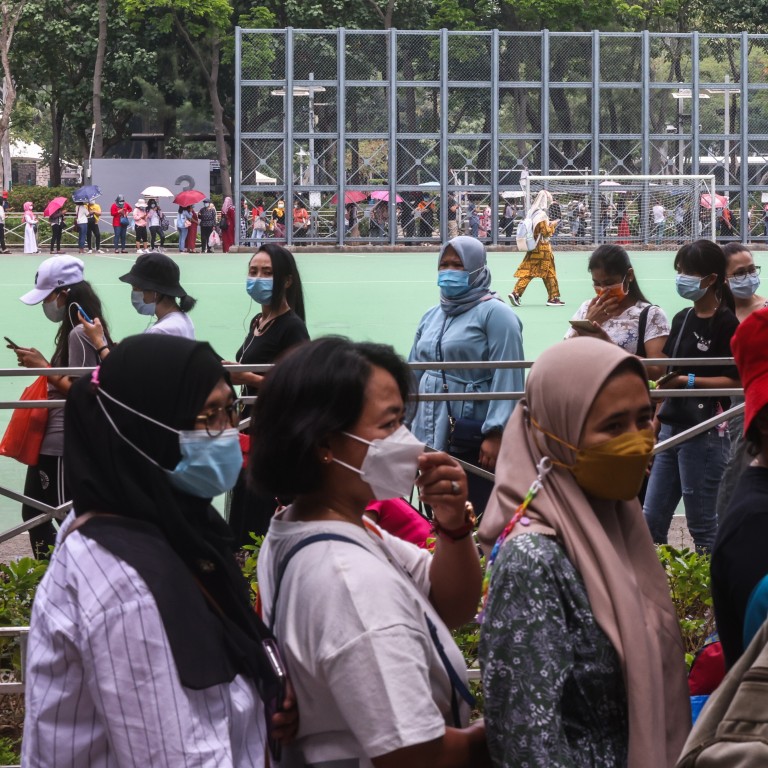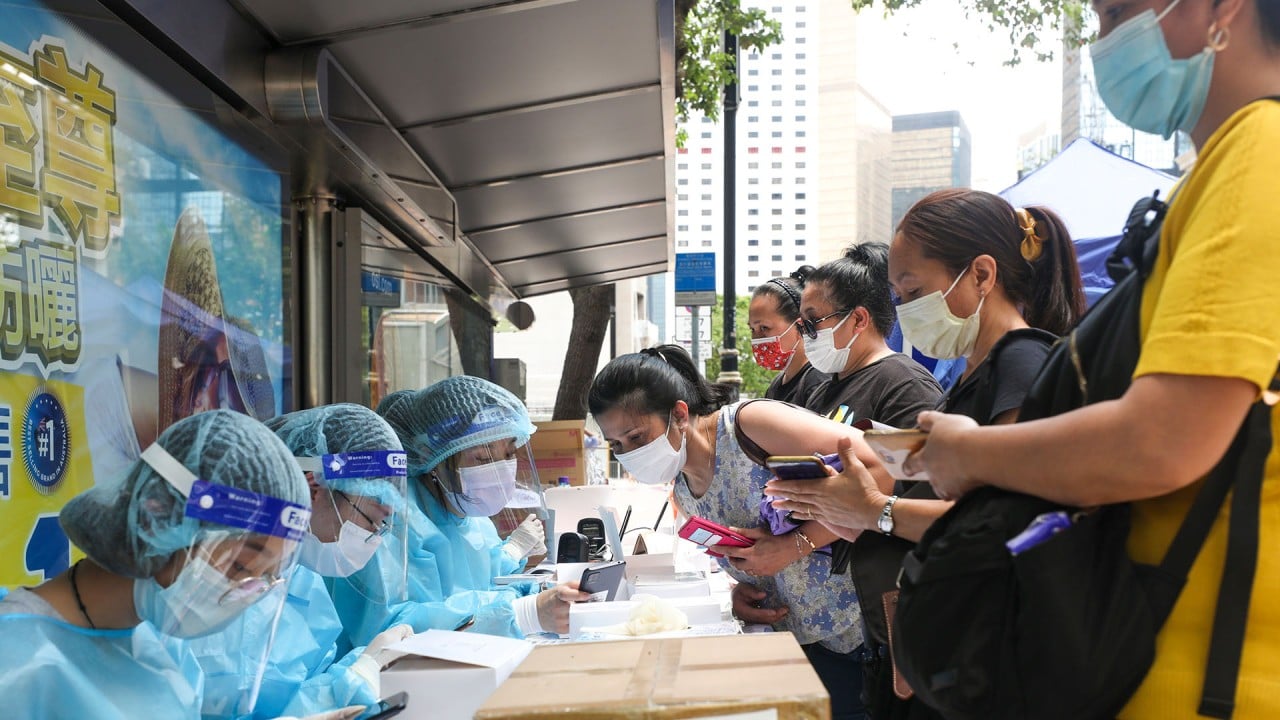
Coronavirus: Indonesia enters fray over Hong Kong’s proposed vaccination rules for domestic workers, as helper group files complaint
- Indonesian consulate joins Filipino counterparts in calling for coronavirus measures to be applied fairly
- New rules require helpers to undergo Covid-19 testing – vaccination requirements also proposed – when seeking work visas or contract renewals
The row over Hong Kong’s proposed new Covid-19 vaccination requirements for foreign domestic helpers deepened on Monday, with the Indonesian consulate also arguing that officials should apply the rules to other non-resident workers in the city if they must come into force.
Indonesia joined the Philippines in appealing for the fairer application of coronavirus measures as Hong Kong’s domestic workers lodged a formal complaint with the Equal Opportunities Commission over the changes.
Officials last week introduced mandatory Covid-19 testing and announced plans for compulsory vaccination for any of the city’s 370,000 helpers seeking work visas or contract renewals, a move the watchdog’s chief has already declared lawful.
Hong Kong shouldn’t force domestic workers to be vaccinated: Philippine diplomat
A spokesman for the Indonesian consulate in Hong Kong told the Post: “We believe that everyone in Hong Kong is having the same responsibility to help fight against the virus by maintaining personal and environmental hygiene as well as participating in the Covid-19 test and vaccination program.”
“If vaccination becomes a necessity to work in [Hong Kong], it should be applied also to other non-resident workers as well, and be clearly stated in the employment contract,” he added.
The consulate echoed an earlier Philippines statement in saying the Hong Kong government did not consult them before unveiling the new measures, adding that dialogue would have been preferable given the change “involves the substantive rights of our nationals”.
The new Covid-19 measures were announced by the government on Friday amid fears a more infectious variant of the coronavirus was being silently transmitted within the community.
Those fears were driven by the confirmation of a 39-year-old domestic helper as the first untraceable case of a mutated strain to be contracted locally, which prompted the quarantine of 1,027 people from a residential block in Tung Chung. All tested negative.

Another domestic helper was also confirmed to be infected with a variant two weeks ago after having arrived recently from the Philippines and completed her quarantine period.
Under the new rules, all domestic helpers – most of whom come from the Philippines and Indonesia – are to be tested before May 9, while the government also plans to require all helpers to get vaccinated before renewing their contracts.
The Labour and Welfare Bureau told the media on Sunday that the government had been liaising with the relevant consulates on Covid-19 issues, and would continue to do so on the future vaccination arrangements for foreign domestic workers applying for contract renewals in the city.
On Monday morning, four members of the Asian Migrant Coordinating Body lodged their complaint with the office of the Equal Opportunities Commission in Wong Chuk Hang, saying the new measures represented a human rights violation.
Any anti-pandemic measure or even the vaccination itself represents differential treatment. Practically, it is extremely difficult to come up with a measure that is not differential
The group’s representative urged the government to reverse its decision, as there was no scientific evidence indicating domestic workers posed a greater risk than other residents. The group is seeking legal advice on potential follow-up action.
But commission chairman Ricky Chu Man-kin told a morning radio programme that equality regulations did not apply to the situation, as reasonable measures to protect public health were exempted. He advised the government and relevant parties to hold more discussions to reach a consensus.
“Vaccination is part of the anti-pandemic measures … Practically, if one cannot [be vaccinated] due to health concerns, they should study if there is another alternative that could achieve the same anti-pandemic effect without violating a person’s rights,” Chu said.
Hong Kong’s citywide vaccination programme has got off to a sluggish start, with just 12.2 per cent of residents having had at least one jab as of Sunday and 6.9 per cent receiving two.
Under Section 61 of the Disability Discrimination Ordinance, the new regulations were not considered discriminatory if “reasonably necessary to protect public health”, Chu said, or if the condition in question was an infectious disease.
Asked if the measures should be imposed on other foreign workers for the sake of fairness, he said: “Any anti-pandemic measure or even the vaccination itself represents differential treatment. Practically, it is extremely difficult to come up with a measure that is not differential.”
But he added that Hong Kong should consider whether public health policy moves were targeting specific races or occupations.
Human rights lawyer and University of Hong Kong principal lecturer Patricia Ho Pui-chi, however, argued the government’s latest move qualified as “direct discrimination” under the Racial Discrimination Ordinance, which protects people from unfair treatment due to their race, colour, descent and national or ethnic origin.
“Direct discrimination occurs when a person is treated less favourably than another under comparable circumstances because of a person’s race. Other domestic and part-time cleaners or helpers are not being forced to be tested,” Ho said.
She further urged the commission to look beyond the discrimination ordinances and study the city’s Bill of Rights, which states that all persons are equal before the law and entitled to equal protection without discrimination.
“While it is not an absolute right, any encroachment of the right to equality should be proportional to the objectives or aims of the policy. Here, more explanations from the authorities will be needed to understand why they consider the mandatory requirement to be proportional. Principles of a good administration in administrative law also require policies to be reasonable and rational,” she added.

03:08
Hong Kong domestic helpers slam ‘discriminatory’ Covid-19 rules
On Monday afternoon, long queues were seen outside Quarry Bay Community Hall as hundreds of domestic helpers braved the rain to wait their turn for screening.
Evelyn Eslafor, 42, who is from the Philippines but has been living in Hong Kong for 10 years, said it was unfair that only helpers were ordered to get tested.
“It should be everybody, we are the same. Chinese people go out and so do we … I think there is a little bit of discrimination,” she said.
“It’s very difficult for us to book appointments because the slots filled up so quickly. We also need to choose a testing centre that is close to our workplace because the wait is so long.”
But a 29-year-old Indonesian named Eva, who has been in the city for nine years, said she understood the government’s decision was made out of public health concerns.
Philippine foreign secretary slams Hong Kong’s push for domestic worker vaccination
“My employer helped me book an appointment today so I could take my holiday over the weekend. I understand why authorities asked domestic workers to get tested and think it’s OK because we will feel safer knowing whether we have the virus or not.”
Hong Kong Chief Secretary Matthew Cheung Kin-chung on Sunday defended the mandatory screening order for domestic workers, saying such measures would protect not only helpers, but also their employers, families and friends.
He also said the jabs requirement was still being studied, and underscored the city’s overall inoculation drive remained vital for recovery from the pandemic.
On Saturday, samples were collected for more 113,000 people, including more than 52,000 domestic helpers at 21 community testing centres and 35 mobile specimen collection stations, marking a record high.



